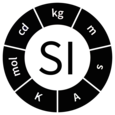Minute

The minute is a unit of time defined as equal to 60 seconds.[1] One hour contains 60 minutes.[2] Although not a
prime symbol ′ is also sometimes used informally to denote minutes.[3]
In the UTC time standard, a minute on rare occasions has 61 seconds, a consequence of leap seconds; there is also a provision to insert a negative leap second, which would result in a 59-second minute, but this has never happened in more than 40 years under this system.
History
Al-Biruni first subdivided the hour sexagesimally into minutes, seconds, thirds and fourths in 1000 CE while discussing Jewish months.[4]
Historically, the word "minute" comes from the Latin pars minuta prima, meaning "first small part". This division of the hour can be further refined with a "second small part" (Latin: pars minuta secunda), and this is where the word "second" comes from. For even further refinement, the term "third" (1⁄60 of a second) remains in some languages, for example
hairspring by Thomas Tompion, an English watchmaker, in 1675.[6]
See also
- Clock face
- International System of Units
- Latitude and longitude
- Orders of magnitude (time)
Notes and references
- ^ a b "Non-SI units accepted for use with the SI, and units based on fundamental constants". Bureau International de Poids et Mesures. Archived from the original on 2014-11-11. Retrieved 2011-05-25.
- ^ "What is the origin of hours, minutes and seconds?". Wisteme. Archived from the original on 24 March 2012. Retrieved 2011-05-25.
What we now call a minute derives from the first fractional sexagesimal place
. - ISBN 978-0141920870.
- ^ Al-Biruni (1879) [1000]. The Chronology of Ancient Nations. Translated by Sachau, C. Edward. pp. 147–149.
- ISBN 978-1855068568.
- JSTOR 7652.
Bibliography
- Henry Campbell Black, Black's Law Dictionary, 6th Edition, entry on Minute. West Publishing Company, St. Paul, Minnesota, 1991.[ISBN missing]
- Eric W. Weisstein. "Arc Minute." From MathWorld – A Wolfram



